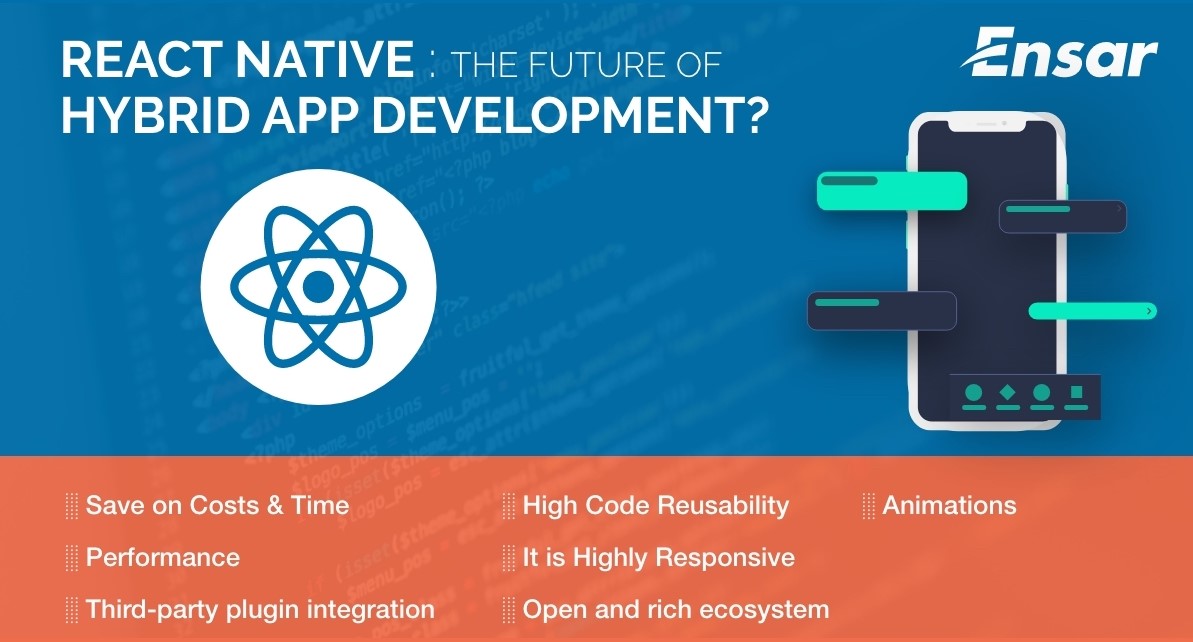It might be the fact that you want to create an app like Instagram, or maybe Skype, Twitter, or Facebook. Once any company makes plans for mobile application development, one question that arises in their mind will be create an app for Android or iOS. Each platform has its pros and cons, such as while iOS offers a superior UX, Android is loaded with the benefits of quicker deployment while maintaining a low cost of development.
It is a fact that the appropriate blend of these platforms will provide faster deployment time, shorter development cycles while exhibiting superior performance as well.
Hybrid applications will bridge the gap between the simplicity of development and user experience while gradually brightening the future of mobile hybrid app development. This choice made the developers create applications for Android and iOS by using a single framework or language. Apart from this, there are certain technologies to provide support for developing hybrid applications. Amongst a lot of choices, React Native, which Facebook supports, leads the way when it comes to UI design framework.
What is React Native?
Mobile app framework React Native is open-source and free. It’s JavaScript’s native library. It simplifies development, improves user experience, and shapes the UI component hierarchy to build mobile apps.
Benefits of React Native in Hybrid App Development
Save on Costs & Time
The cross-platform applications of this platform make it an absolute time saver when it comes to development. Since the code is applicable for both iOS and Android, the business does not have to spend on creating separate apps, instead can focus on investing and creating a unified entity.
In terms of sheer costs, this can be lower than the cost of creating a single app. Moreover, in terms of sheer decision-making, it becomes much easier to launch the app on both platforms simultaneously, saving a ton of time.
Moreover, the fact this is a common platform for both Oss, any updates or maintenance done can simultaneously be applied for both iOS and Android.
Performance
The performance of the hybrid app has been in question for a long time. Frequent crashes, inadequate offline support, poor network conditions, and low speed are some of them. Apart from this, the apps likewise generate some bugs, which make them less user-friendly. Furthermore, hybrid apps take a long time to open, which can frustrate the users out there.
Third-party plugin integration
Does your app idea involve interacting with native apps? Worry not, as the react native platform allows building applications that can use the functionality of native apps. The native interaction enables.
Agile development
Increases app loading speed
Uses less memory
Improve UI experience provides
DOM abstraction
Simplifies programming methodology
It is Highly Responsive
React Native emphasizes the UI design, which makes it responsive and loaded with the best features. Consequently, it reduces the loading time of apps and provides an extremely smoother navigation experience throughout. React Native develops apps with a responsive UI, leading to robust performance and making apps compatible with various mobile devices’ screen resolutions.
Open and rich ecosystem
There has been a massive transformation ever since React Native was released. Lots of industry giants have turned to React Native, particularly due to its richness in an extensive range of modules plus free access.
Despite having different libraries before React Native, different challenges are faced by the developers for coding their apps with superior UX. React Native has helped to make things extremely simple for the developers at present. It provides them with the advantage of customizing until and unless React Native supports it.
Animations
React Native has been adopted by many industry giants at present, particularly social media sites, mainly due to its smooth animated mechanisms. It aids in offering a fantastic user experience which helps to improve the reviews as well as ratings of the apps. As it is known to everybody, visual aid can be considered the most effective aid for showcasing.
Conclusion
It is a fact that Native and hybrid apps come with their advantages and drawbacks. Therefore, the companies must evaluate the option matching their requirements. The native apps will be an appropriate choice in case you are looking forward to the performance and stability of the app. The native apps will coordinate with several other features of a smartphone, including GPS, camera, and calendar. Nevertheless, businesses are in search of quick application development and need good performance across various platforms.
React Native will be most effective for hybrid apps when the top priority of the companies will be to capture the marketing opportunities before other competitors can enter the market. React Native can boast of having a bright future if you are in the requirement of an app delivering an identical experience such as native apps sans compromising the performance.
